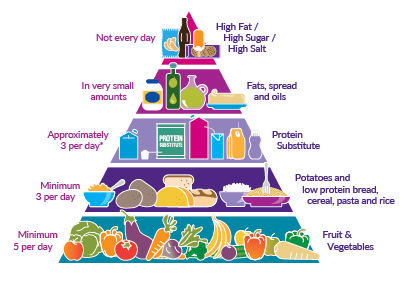Healthy eating on a Low Protein Diet
Being on a low protein diet can be demanding. However, just like everyone else, it is important to eat a healthy, balanced diet. Eating well will help you achieve or maintain a healthy weight and give you more energy so that you can get the most out of every day. Check out the general hints and tips below to get on track to a healthier you.
Include a wide variety of foods from all food groups
In order to eat healthily, it’s important to include a wide variety of foods from all the different food groups. The food pyramid below is a guide to choosing the right foods and it lets you know the amounts of the different foods needed each day and which foods you should use more sparingly.

Note:
- When choosing foods from the groups in the pyramid, be mindful of your exchange allowance>
- Not all conditions will be prescribed a protein substitute or ‘protein alternative’ as shown above – and some conditions may have a higher protein allowance which will change the proportions of the pyramid. Speak to your dietitian for more information about a healthy diet for you.
Have regular meals
Skipping a meal may seem like a good idea when trying to reduce your overall calorie intake. However, skipping meals can increase your likelihood of snacking, overeating at your other meals and choosing unhealthier options. Get off to the right start by having breakfast, lunch and dinner everyday, with a small snack mid-morning and mid-afternoon, if needed. Having a routine can make it easier to stick to your planned meals and snacks.
Think about portion sizes
Eating a wide range of healthy foods is important but often we tend to serve up larger portion sizes than our body needs. When you are serving up your main meals, why not try to reduce your portion size by a quarter and see how you feel? Make sure that you have a large glass of water with your meal and take yourself off to do an activity directly after your meal, waiting for at least 20 minutes before going for seconds if you are still hungry.
While you will be used to measuring your food for exchanges, measuring other foods such as low protein breakfast cereal, pasta and rice can be a good way to make sure that your portion sizes are not increasing gradually and allows you to keep track of what you are having so that you can discuss your weight further with your dietitian. Your dietitian may recommend keeping a food diary.
Take your protein substitute if you are prescribed one
If you are prescribed a protein substitute by your dietitian, make sure that you take the full amount every day, alongside meals if you can. Your protein substitute will help to ensure you meet your nutritional requirements and will help you to feel fuller for longer. Your protein substitute provides a portion of your calories and nutrition which means your portion sizes may need to be slightly smaller to compensate. Speak to your dietitian for more information.
Choose your drinks wisely
Sugary drinks are often a major contributor to weight gain and are very bad for teeth. Did you know that a can of full sugar soft drink contains about 140 calories and 9 teaspoons of sugar? That is the same as eating almost half a sharing bag of Jelly Tots!
Fruit juices can contain a large amount of hidden sugar and, although from a natural source, it can still contribute to weight gain. A small glass of orange juice can contain around 115 calories and 5 teaspoons of sugar. Why not try to have a glass of water and an orange to eat instead?
Try to drink water for your main drink throughout the day. Having a jug in the fridge with some chopped fruit added can be lovely, especially in the summer months. Try sliced lemon, orange, strawberries, mint or whatever takes your fancy. Be cautious of flavoured waters as they can contain a considerable amount of sugar. People with PKU should read all drink labels to ensure they do not contain aspartame.
When choosing low protein milks, Loprofin Drink is similar to a low fat or semi-skimmed milk, whereas Sno Pro is similar to a full fat milk. Speak to your dietitian about using Loprofin Drink if you want a milk substitute with fewer calories.
Think about your snacking
Snacking is one of the easiest ways to cause the calories to add up without realising how much you are eating! If you are snacking, try to go for a healthier option and plan when you are going to have your snacks to avoid grazing throughout the day. Switch crisps for a piece of fruit or some low protein crackers with a topping such as sliced tomato or salsa. Substitute deep fried chips with oven chips cooked at home. Check out the one week meal planner or the Healthy Eating Recipe Book for more ideas or speak to your dietitian.
Choose healthy cooking methods
The way that you cook your food can make a huge difference to the calorie content of your meal. By poaching, boiling, steaming, grilling or oven baking instead of frying or roasting you will cut out a huge amount of fat. Remember that oils (e.g. olive oil) have the exact same calorie content as butter or hard margarines. Try to keep their use in cooking to a minimum – you’d be surprised at the difference it can make!
Make simple swaps to cut out fat and sugar
Many food products on the market have a low-fat or low-sugar alternative. By making these simple changes you can really cut your overall calorie intake. People with PKU should read all labels to ensure they do not contain aspartame.
Examples include:
Full fat butter / margarine ⇨ Lower fat butter and margarines
Salad dressings ⇨ Low calorie salad dressings
Mayonnaise ⇨ Low fat mayonnaise
Fruit juice ⇨ No added sugar squash
Equip yourself with ideas
Make a list at the beginning of each week of the meals you plan to have and make a shopping list of ingredients to bring to the supermarket. You could set aside a day to cook some meals and freeze them so that they are easy to heat up when you are low on time.
Exercise
It’s a lot easier to lose weight and to keep weight off if you exercise in combination with reducing your calorie intake. There’s loads of information available on how you can increase your activity levels – speak to you dietitian for advice.
